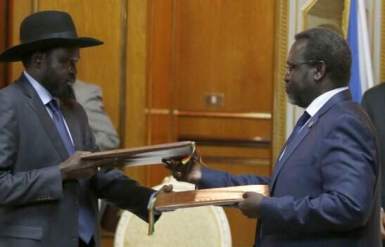S. Sudan’s warring parties sign renewed ceasefire deal amid calls for foreign troops to withdraw
November 9, 2014 (ADDIS ABABA) – The South Sudanese government and the armed opposition faction of the Sudan People’s Liberation Movement/Army (SPLM/A in Opposition) have signed an agreement rededicating themselves to cease hostilities and withdraw all foreign allied forces from the territory of South Sudan.

The declaration was witnessed by the envoys of the Intergovernmental Authority on Development (IGAD) which has been trying to mediate the two warring parties for nearly 11 months.
The deal calls for partial withdrawal of all foreign forces within 30 days from the signing of the document with full withdrawal to be completed when a final ceasefire is sealed.
It also calls for withdrawal of allies forces from areas where protection forces and Monitoring and Verification Mechanism (MVM) are deployed in South Sudan 7 days after the signing of the Cessation of Hostilities Agreement (COH).
“The parties agree to the progressive withdrawal of allies from the areas where MVM and protection forces are deployed, which will begin seven (7) days after signing of the COH implementation matrix, with a partial withdrawal completed after 30 days, and a complete withdrawal from the Republic of South Sudan upon signing of a Permanent Ceasefire Agreement,” partly reads the document.
The allied forces which included the Uganda People’s Defence Force (UPDF), Justice and Equality Movement (JEM) and factions of the Sudan People’ Liberation Army – North (SPLA-N) have failed to withdraw from South Sudan despite 23 January COH which called on them to withdraw.
IGAD also found it difficult to convince both president Yoweri Museveni and president Salva Kiir, who are members of the regional body, to withdraw the Ugandan troops per the agreement it mediated.
The two parties also agreed to reveal locations of their forces, particularly in the greater Upper Nile region where most of the fighting takes place.
They will reveal locations of control and their respective armies’ structures from the divisions down to battalion size group level including names of their commanders and deputy commanders.
The parties also agreed to identify and reveal boundaries between their respective forces and begin to disengage.
The belligerent forces are also called upon in the agreement to identify their county and payam administrators in their respective areas of control.
Negative propaganda against either party whether through TV, radio, internet, newspapers or any other social media should immediately stop, stated the agreement.
The warring parties also agreed to provide unhindered access to humanitarian interventions and organizations, respect human rights and stop mobilising civilians to join their forces.
The accord, which the parties said rededicated themselves to the previously signed, but occasionally violated 23 January CoH, comes two days after the two principal leaders, Kiir and Machar, agreed on most issues in the power-sharing between the president and the prime minister.
The power-sharing agreement provides for the two principals to command their respective armies during the transitional period until an integration process is completed. This will also include deployment of joint presidential guards of the same size from the two factions in the capital, Juba.
However, a permanent ceasefire is yet to be signed after all the security arrangements have been worked out and agreed upon by the two factions.
IGAD WELCOMES AGREEMENT
The regional bloc, IGAD, has issued a press statement hailing the agreement on the implementation matrix.
“Following the conclusion of the 28th extra- ordinary summit of the IGAD assembly of heads of state and government, the IGAD special envoys for South Sudan welcome the agreement today by the Government of the Republic of South Sudan and the SPLM/A (In Opposition) of the implementation matrix and a detailed timetable to implement the Cessation of Hostilities Agreement in South Sudan,” partly reads a press release issued by Hailemichael Gebreslasie, communications officer in the office of the IGAD special envoys.
“Agreement of the timetable is a vital step to bring the war in South Sudan to an end. The IGAD special envoys call on the parties to swiftly and earnestly take all measures to implement the agreed timetable, without delay,” it further reads.
Even though IGAD insisted that the implementation matrix agreement was signed by the two parties in August, the rebel group denied having signed such a document, explaining that what it inked was simply a rededication to the 23 January COH without the matrix and timetables for implementation.
Observers however said the signing of the document by the two parties on Sunday provides only a slim chance for full implementation as the two parties are known for violating the previous agreements, including lack to implement the call to withdraw foreign forces.
Most of the provisions in the matrix would be implemented before the end of November according to the timetable.
(ST)
